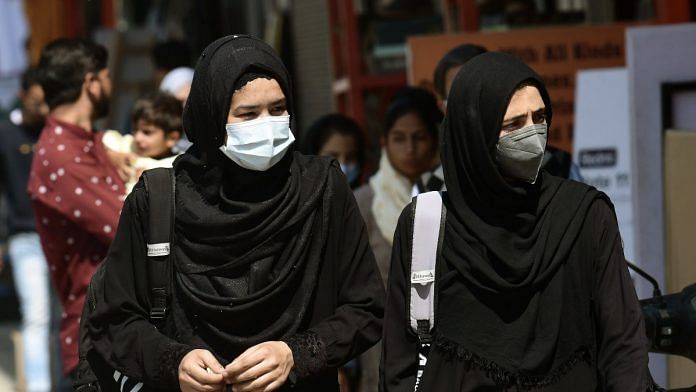The protest by Iranian women against the Islamic Republic’s imposition of hijab has attracted huge support around the world, including in India. But Indian Muslim women’s fight for their right to wear hijab in Karnataka and elsewhere has faced stiff resistance. While both Iranian and Indian women’s protests seek to push back at men imposing their will on women’s choices, and bodies, there is, however, a stark difference in the direction the two protests have taken. In India, the opposition by Hindu groups has had a negative impact on Muslim women’s movements and the progress they had made within their own community.
Several Muslim women I spoke to say their efforts to counter compulsory hijab or patriarchal practices in the Muslim society have been hurt by the communalisation and politicisation of their issues and targeting of the Muslim community by Hindu groups. Muslim women say they now feel the need to be more assertive about wearing hijab because of the attack on their identity and religion. And these attacks have increased since the BJP came to power at the Centre in 2014.
“In 2019, Muslim women came out against triple talaq. But the way BJP’s attack on Muslim society increased has impacted Muslim women’s movement. Right now you cannot raise questions or create agitations on issues like polygamy. Because now the question is about survival,” said Zakia Soman, a women’s rights activist and one of the founding members of Bharatiya Muslim Mahila Andolan
Before that, Muslim women were talking openly about issues like hijab, triple talaq, and polygamy, and taking part in TV debates as well. But the rising attacks by Hindu organisations have made Muslim women see hijab as their identity, which they were previously discussing as a symbol of patriarchy and speaking against those ascribing it as mandatory in Islam.
“Feminists have questioned the patriarchal, misogynist logic behind the veil, the ghoonghat. We cannot reduce the hijab to a matter of identity or community. Surely, there are other ways of asserting one’s identity. That the hijab is essential to Islam is also a superficial, reductionist understanding of the religion,” Noorjehan Safia Niaz, activist and co-founder of BMMA, had told journalist Namita Kohli in an interview in March.
Also read: Study finds recruiters discriminate against Muslim women in hiring at entry-level jobs
Losing the fight on many fronts
Hindutva organisations aren’t the only challenge that Muslim women in India face, Feminists in the country are also divided on the hijab discourse. While some say that hijab cannot be linked to the identity of Muslim women, another section is clear that there is a need to fight the way Hindutva forces are targeting Muslim identity right now.
My women rights friends,
I have seen your statements, read your articles.
I am not fighting to safeguard the hijab. Period.
Refuse to become a pawn between the Hindu Right and the Muslim Right.
Hijab is neither my identity, nor my pride , and not my dignity.
— Shabnam Hashmi (@ShabnamHashmi) February 8, 2022
2) Hijab isn’t your dignity or mine, and that’s fine. But forcing me to stop me from exercising my choice (even if my choice to wear a dupatta or sindoor, or indeed even to marry, is “constructed” or conditioned by patriarchy) would violate my dignity.
— Kavita Krishnan (@kavita_krishnan) February 10, 2022
One part of the divide is also over the question of whether hijab is mandatory in Islam or not.
On one side is the Karnataka government’s decision to ban Muslim girls from wearing hijab in school, which the high court later upheld. On the other side is the Jamiat Ulema-e-Hind, which opposed the ban as unconstitutional and argued that wearing hijab was mandatory in Islam.
Caught between them are the Muslim women fighting conservatism and patriarchy in their families and being deprived of education. And their effort to oppose patriarchy gets undone by the Hindutva attack on their religious identity. In a way, Hindu organisations have not only tried to consolidate their supremacy within the Indian society but have also helped strengthen patriarchy within the Muslim community.
Zakia Soman says that hijab is a patriarchal symbol and women have kept the fight going on against it. But Hindu organisations have reversed the gains and harmed the anti-hijab movement of Muslim women. Earlier they were discussing against compulsory wearing of hijab but now they are accepting and asserting it as a marker of their religious identity.
If Muslim women were not getting their rights inherent in Islam earlier, the politicisation and communalisation of their issues means they are now being deprived of their constitutional rights as well.
Views are personal.
(Edited by Prashant)



